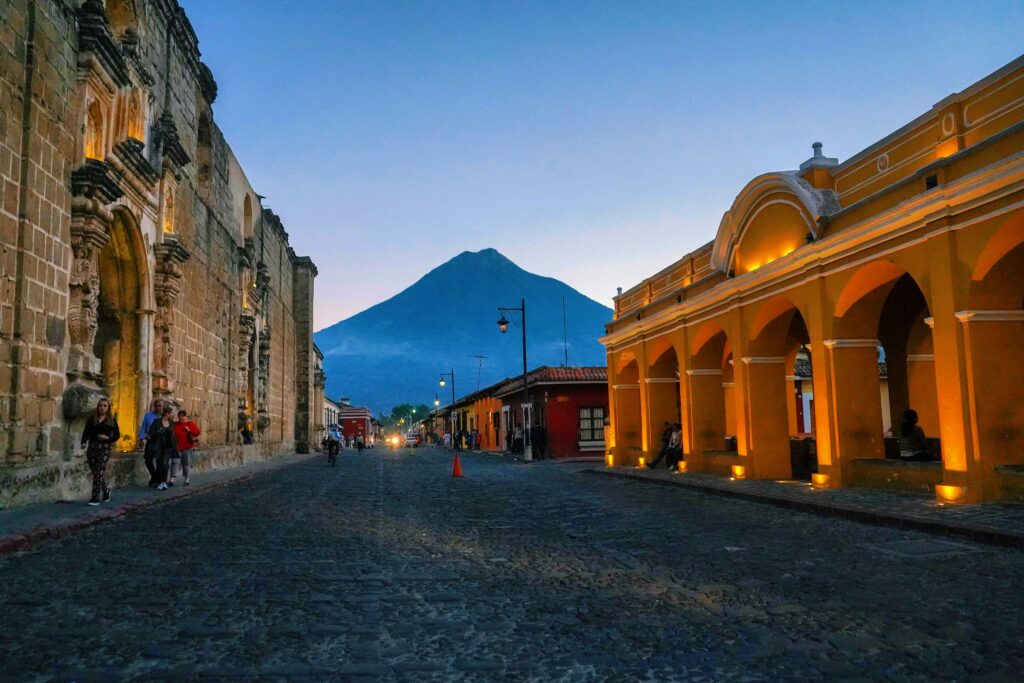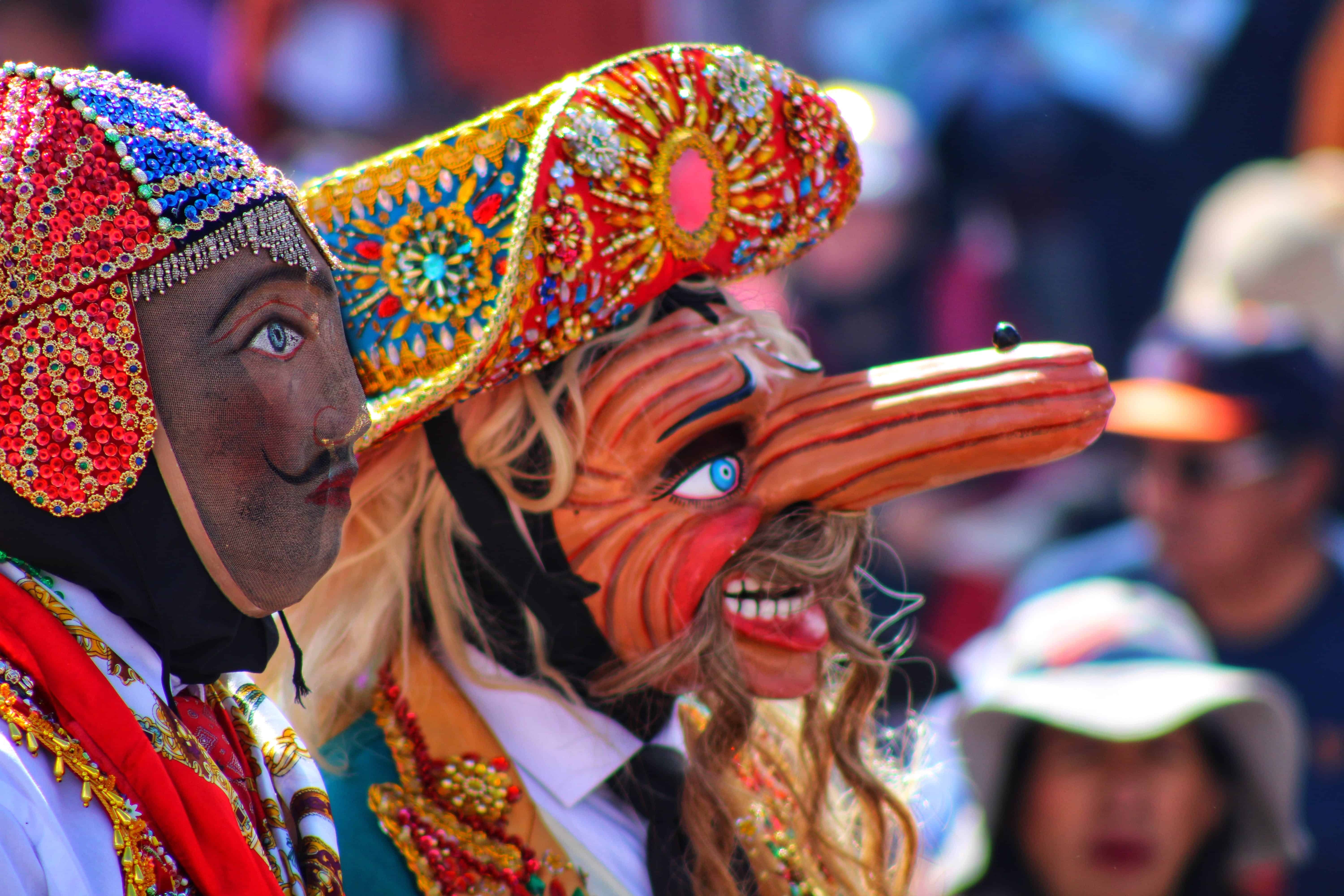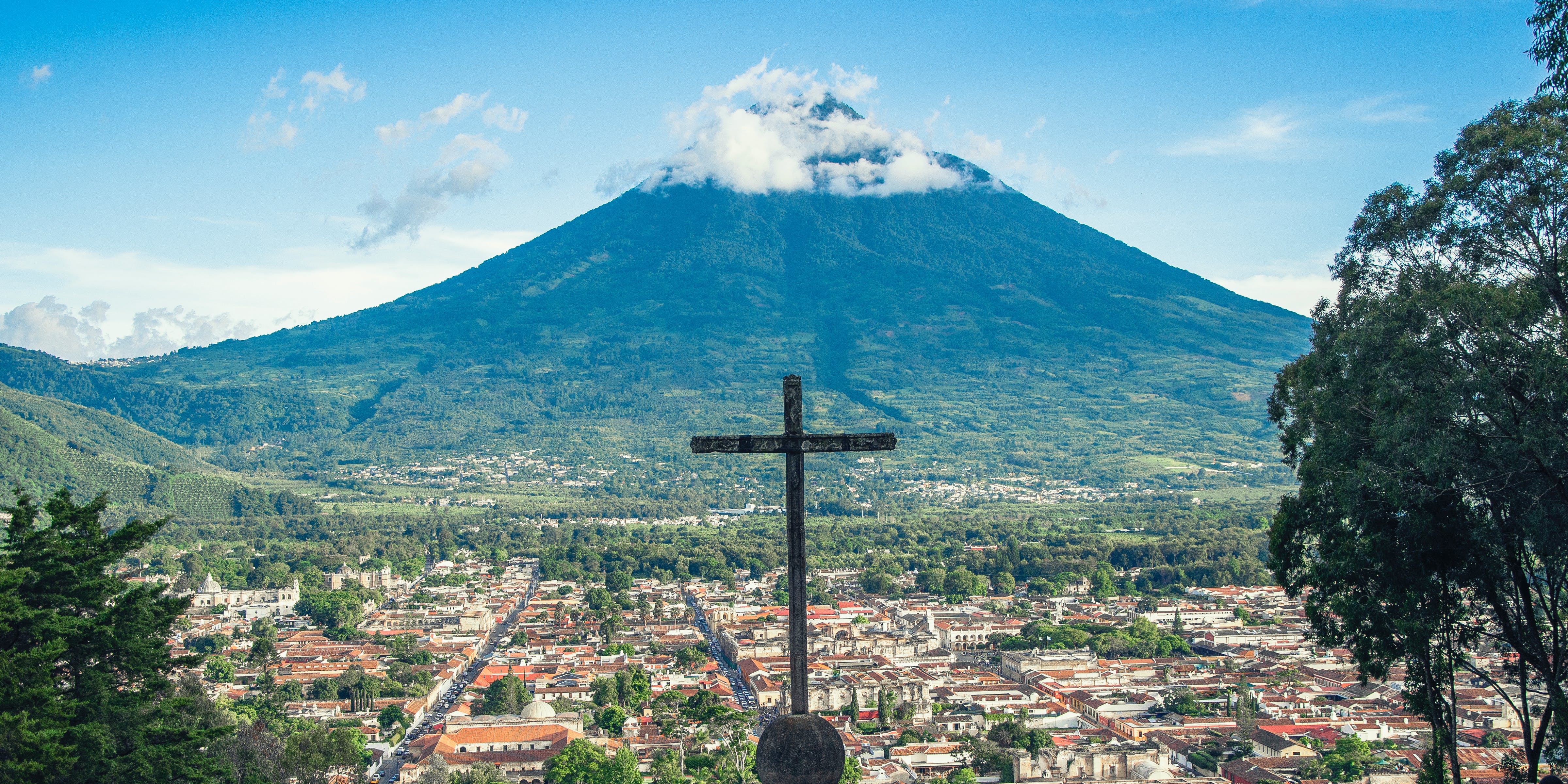
30 Common Guatemalan Slang Terms to Understand the Locals
So you’re set on going to Guatemala?
Here’s my advice: Eat tons of plantains—fried with black beans and rice. Dance to music played by street musicians near the fountain in Antigua.
And be sure to go to Laguna Magdalena (Lake Magdalena) and jump into the cold, turquoise water.
But before you go, learn these 30 most used slang terms, so you can converse with the locals and sound like a native!
Contents
- The Most Common Guatemalan Slang Words
-
- 1. Chapín / Chapina — Guatemalan person
- 2. A huevos — For sure
- 3. Cabal — All good
- 4. Calidá — Cool
- 5. Cerote — Dude
- 6. ¡Aguas! — Watch out!
- 7. Chilero — Awesome
- 8. Pisto — Cash
- 9. Ser muy viernes — It’s such a drag
- 10. Clavo — Problem
- 11. Chucho — Greedy person
- 12. Burra — Bus
- 13. Boquitas — Snacks
- 14. Canche — Blondie
- 15. Charnel — Car
- 16. Chivas — Stuff
- 17. Camioneta — Chicken bus
- 18. Brocha — Bus attendant
- 19. Sho — Hey, shut up
- 20. Casaca — A lie, something that is easy
- 21. Peluche — Relax, do nothing
- 22. Sanigua — Wow
- 23. Patojo — Kid
- 24. Pelar — To gossip
- 25. Shute — Nosey person
- 26. Bochinche — Chaos, a lie, gossip
- 27. Chinchar — To annoy, to nag
- 28. Chispudo — Crafty, quick-witted
- 28. Chancle — Fashionable, elegant; snob
- 29. Pedorro — Smug person
- 30. Caites — Sandals
- Why Learn Guatemalan Slang?
- Guatemalan Slang Quiz: Test Your Knowledge!
- And One More Thing…
Download: This blog post is available as a convenient and portable PDF that you can take anywhere. Click here to get a copy. (Download)
The Most Common Guatemalan Slang Words

1. Chapín / Chapina — Guatemalan person
The “official” Spanish word for a person from Guatemala is Guatemalteco but the term is rarely used outside of textbooks.
Instead, Chapín refers to a Guatemalan male and Chapina to a female.
María es chapina. — María is Guatemalan.
2. A huevos — For sure
This literally means “to the eggs,” but it is used to say “for sure.”
¿Quieres ir al cine mañana? — Do you want to go to the movies tomorrow?
A huevos. — For sure.
3. Cabal — All good
This means that you’re in agreement with a situation, that something is right or correct or that it’s “all good.”
Literally, the word translates to English as “thorough,” but in Guatemala it’s used much more loosely.
Esta musica es cabal. — This music is good.
4. Calidá — Cool
This is the shortened variant of the word calidad, which means “quality,” but Guatemalans use it to say something is cool, or that it exceeds their expectations.
Ese restaurante es calidá. — That restaurant is cool.
5. Cerote — Dude
This is a very versatile word.
It can mean a big piece of excrement, but it’s often used between very close friends as a stand-in for the word “dude.”
¿Qué tal, cerote? — What’s up, dude?
6. ¡Aguas! — Watch out!
Of course, its literal translation is “water,” but when you hear this spoken loudly it means that danger is approaching.
¡Aguas! Una coche viene. — Watch out! A car is coming.
7. Chilero — Awesome
This is another way of expressing appreciation, so if you like what’s being suggested, just use this word!
This is one that has lots of related meanings such as “awesome,” “pretty,” “good,” etc.
Vamos a Panajachel el lunes. — We’re going to Panajachel on Monday.
¡Chilero! — Awesome!
8. Pisto — Cash
This is a slang expression for “cash,” so if you’re going out to eat or plan to catch a tuk-tuk, be sure you have some pisto in your pocket.
¿Tiene pisto para el mercado? — Do you have cash for the market?
9. Ser muy viernes — It’s such a drag
When faced with an event that’s kind of a drag, locals often say, “Ser muy viernes.”
Literally, it means “It’s so Friday,” but it’s understood that Friday means old or something that’s dull.
Este desfile es muy viernes. — This parade is a drag.
10. Clavo — Problem
This word literally means “nail.” For whatever slangy reason, it’s the word commonly used to declare there’s a problem.
Tengo un clavo con mi coche. — I have a problem with my car.
11. Chucho — Greedy person
So, literally, the word means “dog,” but it’s used to refer to a greedy person.
For example, if someone tried to overcharge you on a job or at the market, you would call that person a chucho.
In this instance, it’s a little derogatory—but sometimes it’s a term of endearment!
Él trató de cobrarme 100 quetzales; ¡qué chucho! — He tried to charge me 100 quetzals, what a cheapskate!
12. Burra — Bus
You have to know before you go that the chicken buses in Guatemala are the workhorses of the transportation system.
They’re everywhere, and, very often, have ornately-painted female names above their windshields.
You’ll often hear them referred to as a burra, from the word burro (donkey), but this is actually the word for any type of bus.
Tomo una burra para ir al trabajo. — I take a bus to work.
13. Boquitas — Snacks
If you need a quick little snack, this is the word for you.
You’ll likely see appetizer-like boquitas advertised at restaurants or things like chips and nuts for sale at the small convenience stores.
Necesito ir a la tienda para comprar boquitas. — I need to go to the store to buy snacks.
14. Canche — Blondie
This refers to someone who is blonde and is often used as a term of endearment. In standard Spanish, this would be rubio/rubia.
Mi mejor amiga es una canche. — María is Guatemalan.
15. Charnel — Car
This is a slang term for a car.
Compraré un nuevo charnel cuando termine la escuela. — I’m going to buy a new car when I finish school.
16. Chivas — Stuff
Chivas means all your things or “stuff.”
Tengo que recoger mis chivas. — I need to clean up my stuff.
17. Camioneta — Chicken bus
While we know that chicken buses are all over Guatemala and they’re often referred to as burras, you may also hear them be called camionetas.
Esa camioneta es muy bonita. — That chicken bus is really cute.
18. Brocha — Bus attendant
Now that you know that chicken buses have multiple names, it’s good to know what the bus attendees are called.
A brocha will collect money, call out the next stops and do anything else that needs to be done on the bus.
Dile a la brocha que necesitas ir a la calle Santander. — Tell the bus attendant that you need to go to Santander Road.
19. Sho — Hey, shut up
This doesn’t really have a direct translation but is used in informal situations to tell someone to shut up or grab their attention.
¡Sho! Necesito decirte algo. — Hey, shut up, I need to tell you something!
20. Casaca — A lie, something that is easy
This one can mean one of two things. Casaca can either be a lie or something that is easy.
Me dijo una casaca sobre su familia. — She told me a lie about her family.
Sí, es una casaca hacerlo. — Yes, it’s easy to do it.
21. Peluche — Relax, do nothing
If you head to the Guatemalan coast, you’ll probably do a lot of peluche.
Peluche is to relax or do nothing.
Estoy muy cansada después mi vuelo y he estado de peluche. — I’m very tired after my flight, so I just relaxed.
22. Sanigua — Wow
This means “wow!” Use it to express excitement or amazement.
¡Gané la lotería! — I won the lottery!
¡Sanigua! — Wow!
23. Patojo — Kid
This is a cute little term you’ll probably hear often to refer to a child.
Los patojos van a escuela de lunes a viernes. — The kids go to school Monday through Friday.
24. Pelar — To gossip
This literally means “to peel,” but Guatemalans use it to refer to gossiping or talking behind someone’s back.
Deja de pelar, es grosero. — Stop gossiping, it’s rude.
25. Shute — Nosey person
This term refers to someone who’s nosey.
No te lo voy a decir, shute. — I’m not going to tell you, nosey.
26. Bochinche — Chaos, a lie, gossip
When someone or some thing (like a thunderstorm) causes chaos or disorder on the street, you can call it a bochinche. It can also be used to mean “a lie.“
Después del partido, el estadio era un bochinche total con la gente corriendo en todas direcciones. — After the game, the stadium was a complete chaos with people running in all directions.
27. Chinchar — To annoy, to nag
You know that person who sits behind you at work and won’t shut up all day? He’s annoying you.
Si sigues chinchar con tus quejas, nunca terminaremos este proyecto a tiempo. — If you keep nagging with your complaints, we’ll never finish this project on time.
28. Chispudo — Crafty, quick-witted
Your friend who always gets the joke and always has something clever to say is chispudo.
¡Ese chico es tan chispudo que siempre encuentra una manera de salirse con la suya! — That kid is so crafty; he always finds a way to get his own way!
28. Chancle — Fashionable, elegant; snob
Looking smart can make your Guatemalan friends call you a chancle (or chancla for girls) person, which can mean “elegant” or “fashionable,” such as in:
¡Qué chancle te ves! — You look so elegant!
However, this word can also be used to describe snobbish people in a not-so-kind way, so make sure to practice this word in the right context:
Ese chancle es muy codo. — That snob is so stingy.
29. Pedorro — Smug person
No one can stand a smug person, right? So it’s good that Guatemalan has a word to make fun of them: pedorro.
El nuevo gerente es un pedorro, siempre presumiendo de sus logros y menospreciando el trabajo de los demás. — The new manager is so smug, always boasting about his achievements and belittling the work of others.
30. Caites — Sandals
Often worn by indigenous peoples in Guatemala, caite can be used for any kind of casual sandal now.
El turista caminaba por las calles empedradas con sus caites, disfrutando del cálido sol del verano. — The tourist walked along the cobblestone streets in his sandals, enjoying the warm summer sun.
Why Learn Guatemalan Slang?

There’s more to speaking a language than what comes in the typical textbook. Knowing a language’s slang will bring you a whole new level of understanding and ability to connect with the natives.
Slang differs even by region, so it’s good to know what things only Guatemalans say that even Spanish speakers from other regions may not catch onto.
Knowing Guatemalan slang will also make your experience abroad much more authentic. You’ll be able to communicate as the natives will, strengthening those relationships.
If you want to get some practice with Guatemalan slang, I recommend trying to get as much exposure to native speakers as possible! Even if you can’t converse with a Guatemalan, you can use a program like FluentU to immerse yourself from home.
FluentU takes authentic videos—like music videos, movie trailers, news and inspiring talks—and turns them into personalized language learning lessons.
You can try FluentU for free for 2 weeks. Check out the website or download the iOS app or Android app.
P.S. Click here to take advantage of our current sale! (Expires at the end of this month)

Guatemalan Slang Quiz: Test Your Knowledge!
Now that you’ve learned some Guatemalan slang, it’s time to test your knowledge! Choose the best option for each question below, and just refresh the page if you want to retake it.
Want to learn some other Latin American and Spanish slang? Then check out these handy posts:
Common Spanish Slang from Around the World (Audio Included) | FluentU Spanish Blog
Spanish slang is your key to sounding like a native. And with 291 Spanish slang words and phrases, you’ll be able to fit in with any Spanish speaker! This post shows you…
90+ Mexican Slang Words and Expressions (with Audio and Examples) | FluentU Spanish Blog
Mexican slang is both important to sound local and fun to use. This post will show you over 90 of the most common Mexican slang terms and how they are used. We will also…
51 Cuban Slang Words to Understand the Locals | FluentU Spanish Blog
Learn Cuban slang with these 51 common words and phrases that’ll get you speaking like a local! From greetings and romantic phrases to funny idioms, these Spanish…
Bolivian Spanish (Plus Phrases and Slang) | FluentU Spanish Blog
Bolivian Spanish is the most common language in Bolivia, which is a diverse country with more than 60 languages. It’s significantly influenced by Quechua, an indigenous…
21 Common Nicaraguan Slang Words and Phrases | FluentU Spanish Blog
Learning Nicaraguan slang is key if you’re visiting the country or want to connect with Nicaraguans. Check out these 21 common slang words and phrases used by Nicaraguans…
103 Ecuadorian Slang Words to Communicate with Locals | FluentU Spanish Blog
Ecuadorian slang is extremely colorful and diverse and the more of it you know, the better you’ll be able to communicate. Whether it’s in the city, on the coast, or in the…
79 Colombian Slang Words You’ll Hear in Colombia | FluentU Spanish Blog
Learn some Colombian slang! Follow along with our list of a whopping 79 Colombian words and phrases to sound like a native of the country. Discover a mix of useful, fun…
37 Costa Rican Slang Terms Locals Love | FluentU Spanish Blog
Learning Costa Rican slang will help you understand conversations and the culture in Costa Rica! Click here to see 37 Costa Rican slang words to sound like a native, like…
Now that you know all this Guatemalan slang, you’ll be able to fit in and soon you might hear your new friends say, “¡Qué chilero!” when you pass by!
Download: This blog post is available as a convenient and portable PDF that you can take anywhere. Click here to get a copy. (Download)
And One More Thing…
If you've made it this far that means you probably enjoy learning Spanish with engaging material and will then love FluentU.
Other sites use scripted content. FluentU uses a natural approach that helps you ease into the Spanish language and culture over time. You’ll learn Spanish as it’s actually spoken by real people.
FluentU has a wide variety of videos, as you can see here:

FluentU brings native videos within reach with interactive transcripts. You can tap on any word to look it up instantly. Every definition has examples that have been written to help you understand how the word is used. If you see an interesting word you don’t know, you can add it to a vocab list.

Review a complete interactive transcript under the Dialogue tab, and find words and phrases listed under Vocab.

Learn all the vocabulary in any video with FluentU’s robust learning engine. Swipe left or right to see more examples of the word you’re on.

The best part is that FluentU keeps track of the vocabulary that you’re learning, and gives you extra practice with difficult words. It'll even remind you when it’s time to review what you’ve learned. Every learner has a truly personalized experience, even if they’re learning with the same video.
Start using the FluentU website on your computer or tablet or, better yet, download the FluentU app from the iTunes or Google Play store. Click here to take advantage of our current sale! (Expires at the end of this month.)








